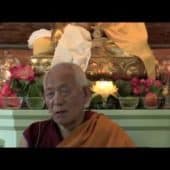Aryadeva’s 400 Stanzas with Geshe Yeshe Thabkhe (2013-17)
Teachings by Geshe Yeshe Thabkhe on Aryadeva’s Four Hundred Stanzas on the Middle Way given at Sravasti Abbey and Tibetan Buddhist Learning Center, New Jersey. With interpretation into English by Joshua Cutler.

Chapter 1: Verses 1-8
Geshe Yeshe Thabkhe begins the teachings on abandoning the belief in permanence by covering Verses 1 to 8 of the root text Chapter 1.
View Post
Chapter 1: Verses 9-16
Geshe Yeshe Thabkhe responds to questions and continues giving commentary on Verses 9 to 16, on coarse and subtle impermanence.
View Post
Chapter 1: Verses 17-25
Geshe Thabkhe concludes teaching on Chapter 1 on loosening our attachment to our loved ones in life and also at the time of death.
View Post
Chapter 2: Verses 26 – 35
Geshe Thabkhe responds to questions and continues teaching on Chapter 2, devoted to abandoning erroneous belief in pleasure by meditating on our body.
View Post
Chapter 2: Verses 36-38
Geshe Thabkhe gives teachings on abandoning the belief in pleasure and refutes that anything that is pleasure by nature exists.
View Post
Chapter 2: Verses 39-50
Geshe Thabkhe continues teaching on the inappropriateness of seeing what is suffering as pleasure, and talks about benefits of the meditation on suffering.
View Post
Chapter 2: Summary and discussion
Geshe Thabkhe outlines the discussion between proponents of truly existent pleasure and suffering and those who refute truly existent pleasure and suffering.
View Post
Chapter 3: Verses 51-66
Geshe Thabkhe teaches on Chapter 3, on abandoning the view of the cleanliness of the body so as to eliminate craving for sensual pleasures.
View Post
Chapter 3: Verses 67–74
Geshe Thabkhe talks about how seeing the impurity of both body and mind will help us reduce attachment to samsara.
View Post
Chapters 3-4: Verses 75-85
Geshe Thabkhe begins teaching on Chapter 4, speaking about the antidote to overcome manifest conceptions of a self and refuting arrogant pride.
View Post
Chapter 4: Verses 85–89
Teachings on how cultivating the correct view of self leads to compassion and explanation of why arrogance is an inappropriate attitude for a country's leader.
View Post
Chapter 4: Verses 90–100
What does it take to be an ethical leader? Is it appropriate for a country's leader to be arrogant and practice violence?
View Post